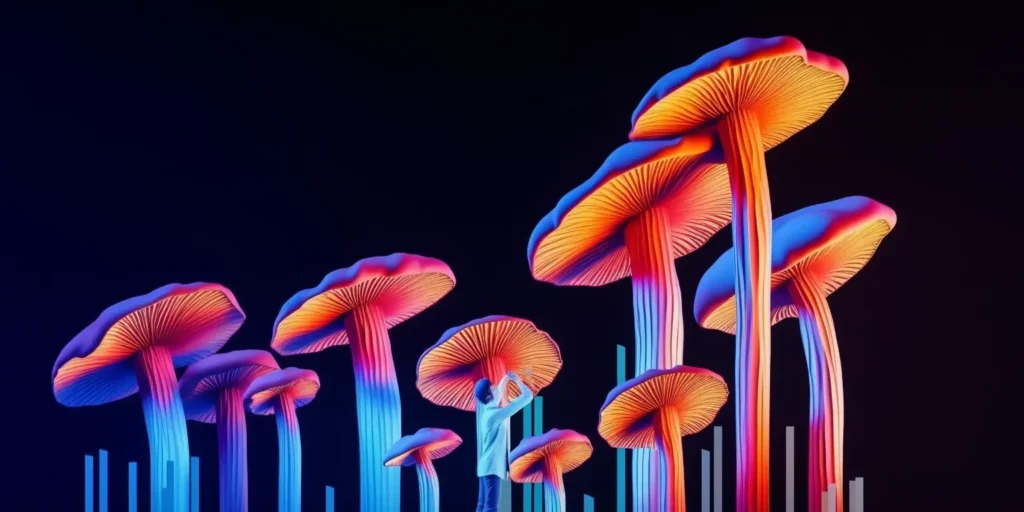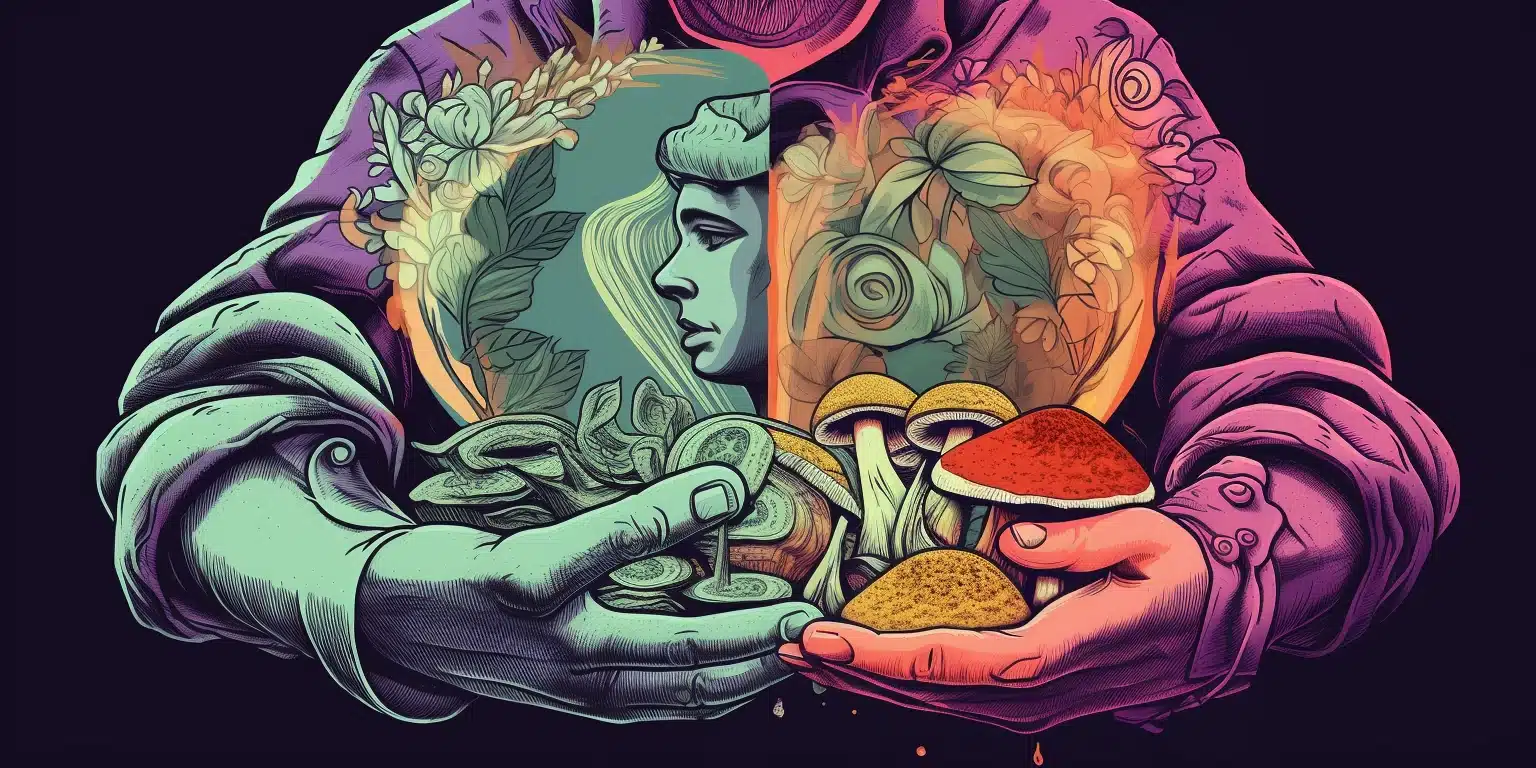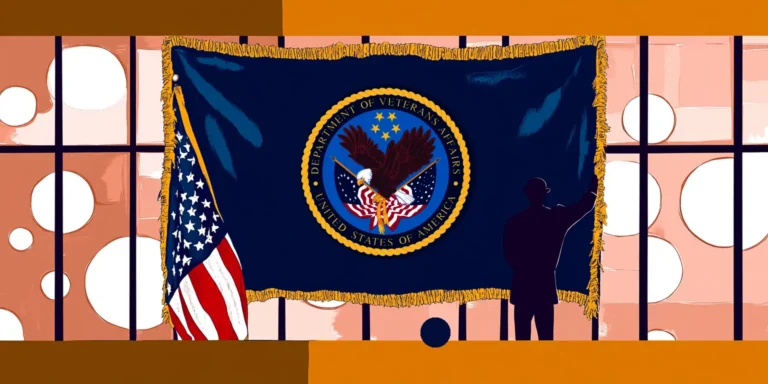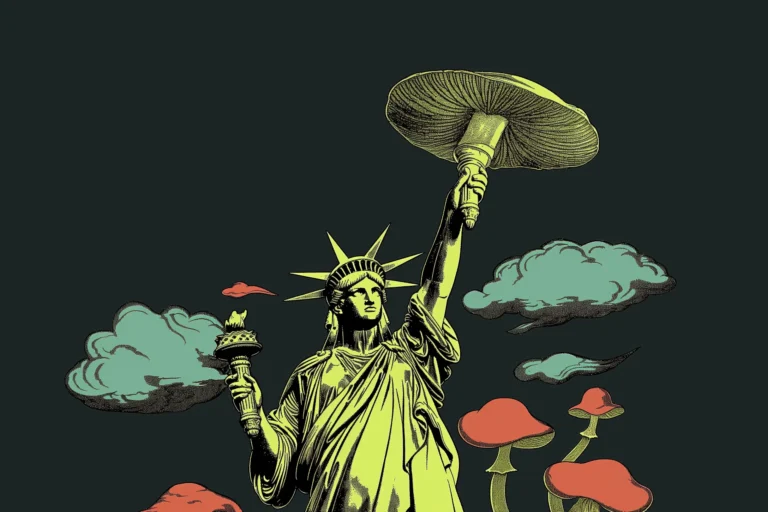In this week’s Psychedelic News Roundups, MDMA-assisted therapy inches closer to potential FDA approval for treating PTSD, which has broader implications for insurance coverage and state legislation, all while public perception continues to shift.
MDMA-Assisted Therapy: A Glimpse into the Future and Insurance Coverage

Coming to us from the Los Angeles Times, MDMA-assisted therapy is gaining traction as a potential treatment for post-traumatic stress disorder (PTSD), with the possibility of FDA approval as early as 2024. This comes on the heels of growing interest in psychedelics, with substances like psilocybin also being explored for therapeutic purposes. Recently, California lawmakers took a step towards destigmatizing psychedelics by narrowly approving a bill to decriminalize the possession and personal use of certain natural psychedelics. However, amidst the enthusiasm, concerns arise about the accessibility and affordability of such treatments, especially for those without the financial means to pay out of pocket.
The cost of MDMA therapy remains uncertain, but it’s expected to be high given the specialized environment and personnel required for its administration. For many, insurance coverage will be the key to accessing this treatment. The path to insurance coverage involves several steps, The first of which is that the mainstream medical community must recognize MDMA therapy as a legitimate treatment. Encouragingly, a Phase III trial in 2021 showed that two-thirds of participants no longer met the diagnostic criteria for PTSD after undergoing MDMA-assisted therapy. Additionally, the American Medical Association has approved billing codes for psychedelic therapy, although this doesn’t guarantee coverage.
Insurance companies will likely cover MDMA therapy if it proves to be a cost-effective solution for treating severe PTSD. Current treatments, such as cognitive behavioral therapy and antidepressants, are ineffective for a significant portion of PTSD patients. Given the associated costs of untreated PTSD, including increased risks of substance abuse and other medical issues, insurance companies might find it financially beneficial to cover this therapeutic intervention. However, government-subsidized insurance programs like Medicaid face budget constraints, making it uncertain whether they can afford such treatments. This raises concerns about equitable access, especially since low-income individuals are more likely to suffer from PTSD. While organizations like the Multidisciplinary Association for Psychedelic Studies (MAPS) are optimistic about broadening access, some experts fear the treatment might remain out of reach for many.(1)
Keep Up with Psychedelic Trends
Don’t miss the latest psychedelic news, events, companies, and more.
We respect and protect your privacy. By subscribing your info will be subject to our privacy policy. Unsubscribe easily at any time
Nationwide Employee Insurance Plans to Cover Ketamine Treatment

Originally reported by Marijuana Moment, Dr. Bronner’s, a soap company, garnered attention last year for offering its employees psychedelic-assisted therapy through its health plan. Now, Enthea, the healthcare nonprofit that facilitated this coverage, is extending the offering of ketamine-assisted therapy as an employee benefit across the U.S. Enthea, branding itself as the pioneer in health benefit plans covering psychedelic-assisted therapies, announced that employers can now easily add ketamine therapy to their coverage, akin to dental and vision benefits.
Enthea CEO, Sherry Rais, emphasized the company’s mission to assist employers in addressing workplace mental health issues. This expansion has been made feasible due to Enthea’s new collaborations with Skylight Psychedelics and Innerwell. The partnership with Dr. Bronner’s in 2022 saw approximately 7% of its workforce opting for the ketamine-assisted therapy, with many reporting significant mental health improvements. The treatment reportedly alleviated symptoms of PTSD by 86%, major depressive disorder by 67%, and anxiety by 65%.
Ketamine, approved by the FDA as an anesthetic, is increasingly recognized as an effective treatment for conditions like treatment-resistant depression and PTSD. While not specifically approved for psychiatric disorders, it can be administered off-label. An FDA-approved variant, esketamine nasal spray, is authorized for treating treatment-resistant depression. Both substances are classified under Schedule III of the Controlled Substances Act.
Despite the therapeutic potential of ketamine, obtaining coverage through mainstream insurance can be challenging. However, the National Institute on Drug Abuse (NIDA) Director, Nora Volkow, acknowledged the promising research on ketamine’s benefits and emphasized the need for further studies.
Enthea plans to further expand its services to include MDMA and psilocybin-assisted therapies upon their approval. The FDA, recognizing the potential of these substances, designated MDMA as a “breakthrough therapy” in 2017. Recent Phase 3 trials have shown promising results for MDMA-facilitated talk therapy in treating PTSD.
Dr. Bronner’s CEO, David Bronner, has been a proactive supporter of psychedelics and marijuana policy reforms, funding initiatives for psychedelics legalization in states like Oregon and Colorado. Enthea, inspired by the positive outcomes from its partnership with Dr. Bronner’s, aims to broaden its treatment plan to encompass telemedicine and at-home ketamine care in collaboration with wellness provider Nue Life.(2)
Keep Up with Psychedelic Trends
Don’t miss the latest psychedelic news, events, companies, and more.
We respect and protect your privacy. By subscribing your info will be subject to our privacy policy. Unsubscribe easily at any time
New Congressional Bill Seeks to Protect States Legalizing Psilocybin from Federal Interference

As covered by Marijuana Moment, a new congressional bill, titled the Validating Independence for State Initiatives on Organic Natural Substances (VISIONS) Act, has been introduced to prevent federal interference in states or local jurisdictions that legalize psilocybin mushrooms. Sponsored by Reps. Robert Garcia (D-CA) and Earl Blumenauer (D-OR), the legislation stipulates that no federal funds can be used to obstruct states or local governments from enacting their own laws related to the use, distribution, sale, possession, research, or cultivation of psilocybin. This mirrors existing protections for state medical cannabis programs.
Garcia emphasized the therapeutic potential of psilocybin, highlighting its benefits for individuals suffering from mental health disorders such as anxiety and depression. He also pointed out the positive impact of such treatments on military and law enforcement veterans. Blumenauer, representing a state that legalized regulated access to psilocybin in 2020, criticized the federal government’s longstanding resistance to recognizing the therapeutic benefits of the substance.
The introduction of this bill is timely, especially for California, where a bill legalizing the possession and cultivation of certain psychedelics for adults aged 21 and above is awaiting the governor’s approval. Psychedelics reform has been a recurring topic in Congress, with the House Rules Committee recently clearing two psychedelics research amendments. Additionally, the Food and Drug Administration (FDA) has been proactive in facilitating research into psychedelic therapies, designating both psilocybin and MDMA as “breakthrough therapies.” The National Institute on Drug Abuse (NIDA) has also shown interest in the potential therapeutic applications of psychedelics, allocating funds for research and emphasizing their potential in treating mental health conditions.(3)
Learn More About The Complexities of Psychedelic Decriminalization and Legalization
Psychedelics Companies on the Rise

An article from Wealth Daily, discusses how recent developments in the psychedelics industry have garnered significant attention, with companies experiencing notable growth. As mentioned, the nonprofit Multidisciplinary Association for Psychedelic Studies (MAPS) recently released encouraging Phase III trial data for MDMA therapy in treating PTSD. Their aim is to commercialize prescription psychedelics to be used in conjunction with traditional therapies. The study revealed that MDMA-assisted therapy led to significant improvements in PTSD symptoms, with 86.5% of participants showing clinically meaningful improvement.
This positive news has amplified the conversation surrounding psychedelics. Unlike many pharmaceutical drugs that treat symptoms, MDMA therapy has shown potential in eliminating PTSD in the long term. Rick Doblin, the founder of MAPS, stated that MDMA-assisted therapy for PTSD could be considered for FDA approval by 2024. This development is seen as a significant milestone for both the healthcare and psychedelic industries.
The interest in psychedelics has been further fueled by popular culture, with bestsellers like How to Change Your Mind being adapted into a Netflix series and influential figures like Joe Rogan hosting experts on the subject. Mainstream media outlets, previously hesitant to cover the topic, have now started reporting on it, with CNBC, Forbes, and The Wall Street Journal among those running stories on psychedelics.
High-profile endorsements, such as hedge fund manager Steve Cohen’s recent purchase of nearly 19 million shares of Cybin, have further propelled the industry. The shift from anecdotal evidence to scientific research has solidified the health benefits of psychoactive compounds. Studies indicate that compounds like psilocybin promote neuroplasticity, making them potential treatments for various conditions, from depression to alcoholism.
The psychedelics industry is poised for significant growth, with some comparing its potential to the pharmaceutical industry in the 1920s or the internet in the 1990s. The industry’s potential is underscored by statistics from the NIH, which state that 5% of adults experience PTSD annually, and over 8% of U.S. adults have had a depressive episode. With the increasing likelihood of FDA approval for drugs like MDMA, the industry is on the brink of a major breakthrough.(4)
Naturalistic Psilocybin Use Shows Lasting Mental Health Benefits: A Study Overview

A New Study published in Frontiers in Psychiatry, discusses the results from a recent psilocybin study. Psilocybin has gained renewed attention in clinical research due to its potential mental health benefits. While preliminary trials have shown promise, there’s been a surge in naturalistic psilocybin use outside of research settings. However, the public health impact of such use is not well-documented.
A prospective, longitudinal study was conducted involving six sequential automated web-based surveys. These surveys collected data from adults intending to use psilocybin outside of clinical research settings. The surveys were administered at various time points: at the time of consent, 2 weeks before, the day before, 1-3 days after, 2-4 weeks after, and 2-3 months after psilocybin consumption.
Out of 2,833 respondents who completed baseline assessments about two weeks before psilocybin use, 1,182 finished the two-four week post-use survey, and 657 completed the final follow-up survey two-three months after consumption. The majority of participants were college-educated white men from the United States, with an average age of 40 years, and had prior experience with psychedelics. Most participants consumed dried psilocybin mushrooms (average dose of 3.1 grams) primarily for “self-exploration.” Longitudinal data revealed sustained reductions in anxiety, depression, and alcohol misuse after psilocybin use. Additionally, there were increases in cognitive flexibility, emotion regulation, spiritual well being, and extraversion, and reductions in neuroticism and burnout. However, a small percentage of participants (11% at two-four weeks and 7% at two-four months) reported lasting negative effects, such as mood fluctuations and depressive symptoms.
This study, being the most extensive prospective survey on naturalistic psilocybin use to date, underscores psilocybin’s potential to bring about enduring improvements in mental health and overall wellbeing. However, it’s essential to note that a minority experienced persistent negative effects post-use.(5)
The resurgence of interest in psychedelics as therapeutic agents marks a significant departure from traditional mental health treatments. As clinical trials continue to validate their efficacy, the challenge remains in integrating these treatments into mainstream healthcare, ensuring equitable access, and navigating the regulatory intricacies. The journey of psychedelics, from societal taboos to potential therapeutic marvels, underscores the importance of evidence-based research in shaping the future of mental health care. As we stand on the cusp of what could be a new era in psychiatry, continued exploration, understanding, and dialogue will be crucial.
Sources

1. Newberry, L. (2023). MDMA-assisted therapy could soon be approved by the FDA. Will insurance cover it? – Los Angeles Times. Los Angeles Times. https://www.latimes.com/lifestyle/newsletter/2023-09-19/mdma-assisted-therapy-could-soon-be-approved-by-the-fda-will-insurance-cover-it-group-therapy?utm_source=reddit.com
2. Adlin, B. (2023, September 20). Healthcare Provider Will Offer Coverage For Ketamine Treatment On Employee Insurance Plans Nationwide – Marijuana Moment. Marijuana Moment. https://www.marijuanamoment.net/healthcare-provider-will-offer-coverage-for-ketamine-treatment-on-employee-insurance-plans-nationwide/
3. Jaeger, K. (2023, September 20). Congressional Lawmakers File New Bill To Protect States That Legalize Psilocybin From Federal Intervention – Marijuana Moment. Marijuana Moment. https://www.marijuanamoment.net/congressional-lawmakers-file-new-bill-to-protect-states-that-legalize-psilocybin-from-federal-intervention/
4. Wealth Daily. (2023, September 20). Psychedelics companies are skyrocketing – Wealth Daily. https://www.wealthdaily.com/psychedelics-companies-are-skyrocketing/
5. Nayak, S. M., Jackson, H., Sepeda, N. D., Mathai, D. S., So, S., Yaffe, A., Zaki, H., Brasher, T. J., Lowe, M. X., Jolly, D. R. P., Barrett, F. S., Griffiths, R. R., Strickland, J. C., Johnson, M. W., Jackson, H., & Garcia-Romeu, A. (2023, August 14). Naturalistic psilocybin use is associated with persisting improvements in mental health and wellbeing: Results from a prospective, Longitudinal Survey. Frontiers. https://www.frontiersin.org/articles/10.3389/fpsyt.2023.1199642/full?&utm_source=Email_to_authors_&utm_medium=Email&utm_content=T1_11.5e1_author&utm_campaign=Email_pu
This material is not intended as a replacement or substitute for any legal or medical advice. Always consult a medical professional about your health needs. Psychedelics are widely illegal in the United States, and readers should always be informed about local, state, and federal regulations regarding psychedelics or other drugs.

 David Connell
David Connell
 Ross Dillon
Ross Dillon 
